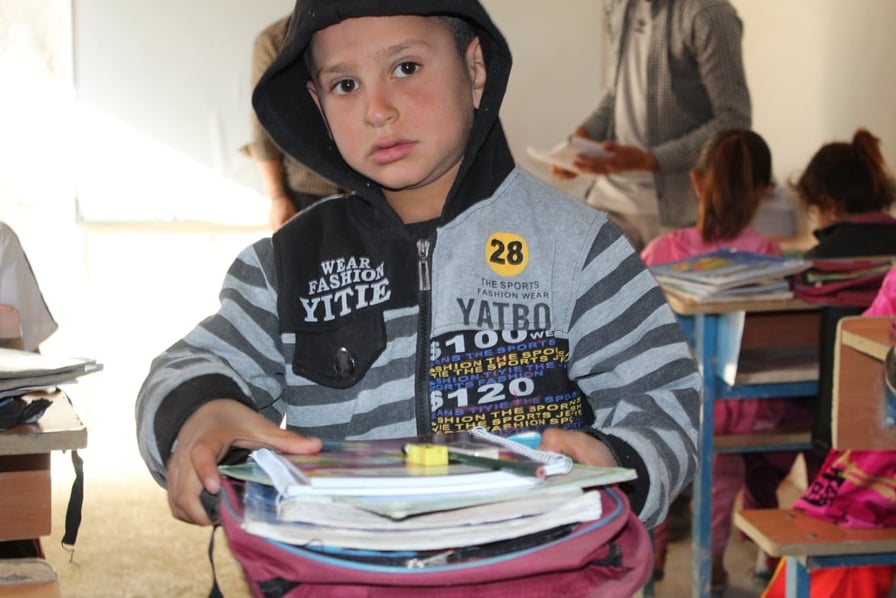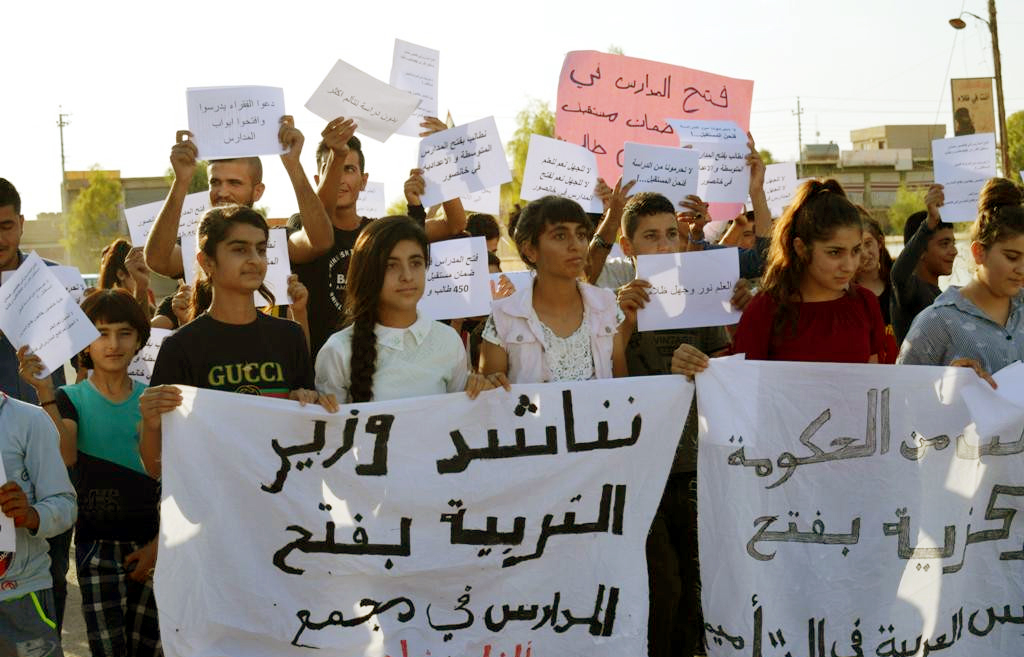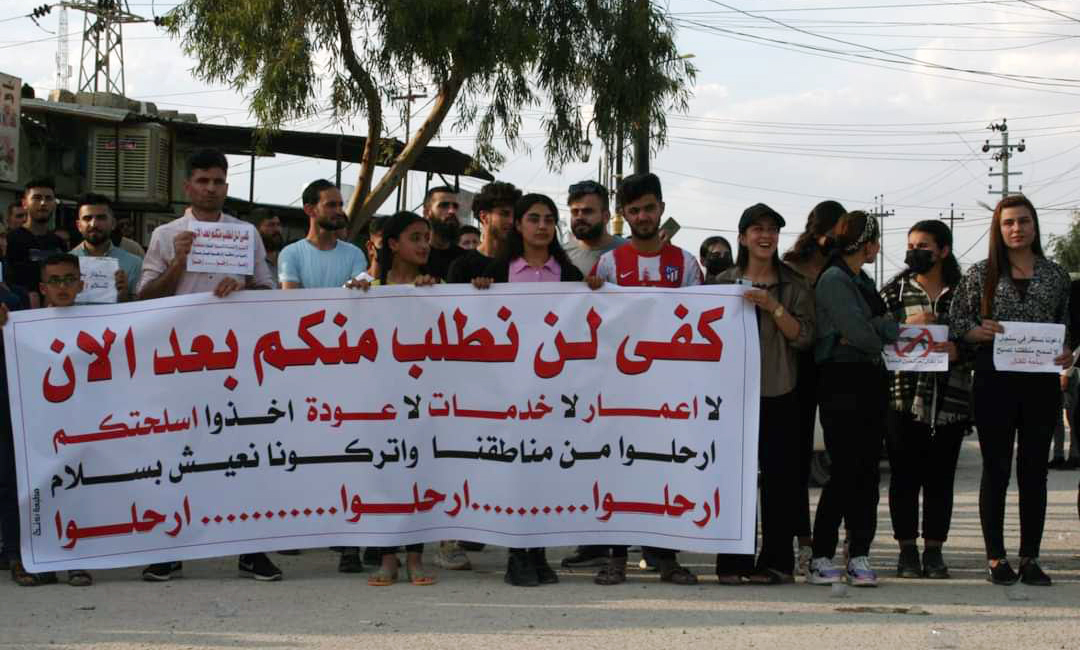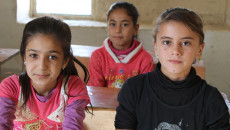A number of schools in the war-torn Shingal region, home to the Ezidi community in Ninewa province, have turned into bases and headquarters of the military and security forces in a time the education sector is deeply in need for buildings.
Several sources told KirkukNow's reporter, armed forces have been deployed in at least four school buildings in the center of Shingal, Sinuny subdistrict and Khanasur.
Kamal Hassan, director of Sarkawtin High School in Shingal, told KirkukNow, “The main problem is the lack of buildings. 80% of our schools belong to Arabic education (funded by Baghdad) including ours so the Kurdistan Regional Government (KRG) needs to build schools so that we do not stay as guests.”
There are two directorates for education in Shingal, alike all other disputed territories. the Kurdish and the Arabic Education departments, one is funded by Baghdad which teaches curriculums in Arabic and the other is funded by the KRG and teaching in Kurdish, has 54,000 students.
A two-floor Kurdish education building in Shahidan neighborhood of Shingal, according to education officials, have turned by the Shingal Resistance Units (YBŞ), affiliated to Kurdistan Workers Party PKK, into Latin education, which they administer and does not belong to the directorate of education.
Shahab Ahmad, the administrative director of Kurdish education in Shingal, told Kirkuk Naw that a high school that used to be an institute for preparation of primary schools’ teachers is now occupied by YBŞ forces in Shingal following October 2017 when the Iraqi Security Forces ISF ousted the Kurdish forces from the disputed territories.

On October 16, 2017 and the following days, part of the administration of the disputed areas, along with the Kurdish forces and the Peshmerga retreated, when relations between the two federal governments and the KRG, due to the referendum for independence by the Kurdish political parties.
"The school is very big and we need it, despite the letter of the governor's office to the Ninewa administration, but it has not been useful and we do not have the authority to take it back.
Kurdish Education of Shingal has 55 primary and secondary schools in Shingal, some of which operate in Arabic education buildings, in addition to opening about 90 primary and middle schools inside the IDP camps.
The General Directorate of Shingal Education had 27,000 students in the 2021-2022 school year, 14,000 of whom live in camps for the internally displaced persons IDP, especially in Dohuk Northern Province, while another 13,000 reside outside the camps.
Shingal, 120 km west of Mosul, is home to the Ezidi community and administratively under Ninewa province, and part of the disputed areas between the Iraqi federal government and the Kurdistan Regional Government KRG.
We have no authority to take back our schools
Hassan Salah, director of education in Shingal, funded by Baghdad, told KirkukNow, “We have two schools in Khanasur under the control of YBŞ, one of which has been turned into its own hospital by YBŞ and the third is turned into a police station in Sinuny."
“The YBS have taken a Kurdish education school in Shingal,” he added.
There are about 100 Arabic schools, some of which have three shifts due to lack of buildings.
Education in Iraq used to be one of the best education systems in the region yet decades of conflict and under-investment in Iraq have destroyed the system. Iraq’s national budget has in the past years allocated less than 6% of its national budget to the education sector, placing Iraq at the bottom rank of Middle East countries.
Iraq’s infrastructure is in ruins in many parts of the country; one in every two schools is damaged and needs rehabilitation. A number of schools operate in multiple shifts in an attempt to accommodate as many students as possible, squeezing the little learning time that children have, a report by the UNICEF about education in Iraq has found in 2016.

Hassan Salah said some of the Kurdish schools are using their schools due to the lack of buildings. “We have requested our schools. The police promised to turn in the one they are using early October with opening of Shool and will try to get back those used by YBS peacefully.”
In August 2014, the extremist militants of the Islamic State in Iraq and Syria ISIS stormed Shingal, killing more than a thousand Ezidis for being non-Muslims, including children. The extremist group has enslaved more than 6,000 civilians, nearly 2,000 children were rescued, and the fate of about 3,000 is still unknown.
"We have turned only one school in Khanasur into a hospital and our forces have not been deployed in any other school," said Khudeda Elias, head of the pro-PKK self-governing council in Shingal.
"There are no armed forces in any schools in the center of Shingal. There may be YBS forces in Sinuny and Khanasur or some villages, as some of the schools have not been renovated, villagers not back yet" a police source told KirkukNow on the condition of anonymity.
In the middle of this year, following the emergence of security tensions, a number of young people in Shingal demanded that all armed forces leave the district and only the local police remain, but their efforts were in vain.
Khudeda Chuki, mayor of Sinuny, affirmed he can coordinate with the education directorate to take back the two schools from the YBŞ, “but we cannot help the police,” without giving further explanation.
According to the Shingal agreement of 2020 signed between the federal government and the KRG, a new administration to be formed for the district, reconstruction and reorganization of the security situation, but the agreement has not been implemented yet.
The Ezidis constitute 30% of the 664,000 IDPs. Last May, thousands of Ezidi families were again displaced from their hometowns to the IDP camps again due to the tension and armed clashes that erupted in the area between the armed groups.






